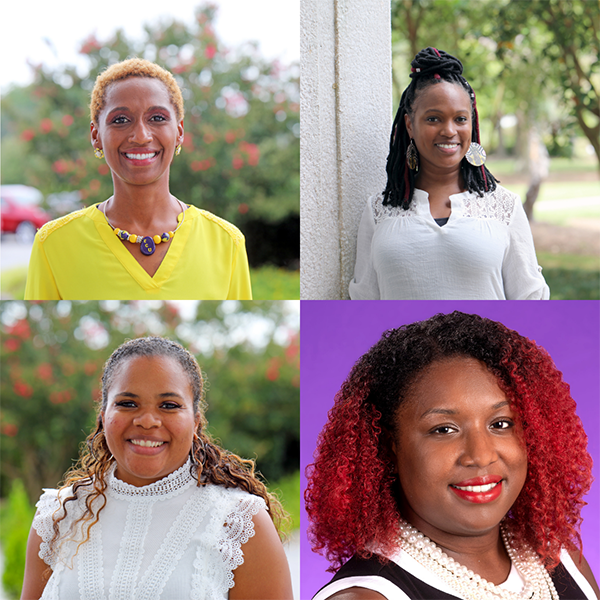Faculty explore experiences as Black women in academia
Creating supportive spaces that allow Black women faculty to find their collective voice is important to four East Carolina University College of Education faculty members.
Drs. Mikkaka Overstreet, Janeé Avent Harris, Loni Crumb and Christy Howard co-wrote an article, “Facing the Storm: Our First Annual Faculty of Color Writing Retreat as a Microcosm for Being a Black Woman in the Academy,” which was published in the Journal of Contemporary Ethnography. The article focused on their experience holding an inaugural faculty of color writing retreat.

Four faculty members in the East Carolina University College of Education shared their experiences as Black women in academia through a writing retreat. Dr. Loni Crumb (top left) and Dr. Janeé Avent Harris (bottom right) are from the Department of Interdisciplinary Professions while Dr. Mikkaka Overstreet (top right) and Dr. Christy Howard (bottom left) are from the Department of Literacy Studies, English Education and History Education. (Contributed images)
The retreat was the culmination of layers of support and community that the faculty had built together. The College of Education conducted a study confirming faculty of color’s experiences and feelings concerning discrimination, appreciation, tenure and promotion. This study led the college’s diversity committee to make several recommendations to senior leadership.
“One of the recommendations from the study was to form a faculty of color group,” Overstreet said. “This recommendation parallels other suggestions found in the literature related to faculty of color. (Research by) Brown-Glaude suggested that not only should Black women contribute to the creation of new knowledge through scholarship, but they should feel empowered to create ‘new spaces’ that are affirming and powerful for them personally and professionally.”
Overstreet, Avent Harris, Crumb and Howard planned to hold their retreat at a waterfront beach home. Their article turns their experience renting a cottage that didn’t match the listing description into a metaphor of their experiences working in academia.
“It is our hope that this article provides an understanding of how Black women faculty can lean on their cultural strengths and ingenuities as a means to persist and advance in the professoriate,” Overstreet said. “Additionally, our hope is that program administrators and other stakeholders will use the content of this article to address issues of racism, classism and sexism and to implement policies to ensure that the higher education climate is welcoming and supportive of the advancement of Black women faculty.”
Throughout the article, the four women share their thoughts and feelings, blending their experiences together into a cohesive narrative.
“In my opinion, this is how literal or figurative storms should be faced in both personal and professional environments: with solidarity,” Crumb said. “No movement is done alone.”
This storm imagery was woven throughout the article and formed the basis of Overstreet’s main takeaway. The time that the women were able to share stories about their work, families and experiences created a bond, allowing them to learn with and from each other.
“One of the most beautiful things about Black women is that as the storms come into our lives, we are prepared to weather them. We are equipped to figure it out,” she said. “The retreat proved to be no different, but this time, we were not ‘one of few’ in the context of academia; we were collectively prepared and united to face the obstacle of claiming our time in the context of our retreat.”
While the women were able to weather their storm, they cautioned people against perpetuating the Black Superwoman phenomenon or syndrome, a phrase created by University of North Carolina at Chapel Hill’s Dr. Cheryl L. Woods-Giscombe to describe the ways Black women must continuously be “strong” for themselves and others.
“The Black Superwoman phenomenon could potentially subject Black women to increased emotional and physical exhaustion and psychological distress,” Overstreet said. “Thus Black women deserve safe spaces in academia to be vulnerable and be supported without fear of negative consequences.”
Faculty plan to hold future retreats and would like to expand them with the support of the College of Education and leadership.
“The question ‘How do Black women faculty create and navigate spaces to promote their success within academia?’ is a question we all should be asking ourselves and each other in order to improve,” said Dr. Allison Crowe, acting chair for the Department of Interdisciplinary Professions. “I am so happy these outstanding women scholars are sharing their experiences in this important piece.”